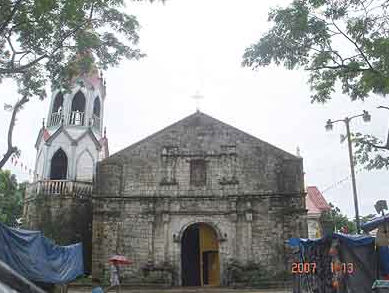
Smooth warm skin and the smell of it, of Tavo's hair, or my shampoo. The birds trill and staccato. For a moment, I'm full of joy. Tavo's body against mine, his slim elegance, his buttocks against my lower belly, his back against my breast, my nose touching his neck and nape, his tender beauty in my arms is all I want, all I need. I open my eyes: The rain wet Bougainvillea leaves glisten in the early morning sun. On a chair are Tavo's short trousers and his polo shirt, on the dresser my white underwear, white shirt, black socks, freshly pressed black soutane for the day, arranged by Tavo with the same love he is giving me even in his sleep. Below the dresser, the black shoes he polishes daily for me. I kiss him softly, thankfully.
Downstairs, Concepcion bangs the main door shut. Soon breakfast will be ready. Tavo will hurry over to the church to ring the bells while I shave, shower and dress. Two cups of strong coffee achieve my matutinal mutation change into who I'm supposed to be: The priest.
Mass is a ballet I perform with Tavo, meaning nothing to nobody. Few people in the church; no coins drop into the box. Confessions while the confessional is not yet too hot. I try not to hear what I'm told against my will, absolving all and every sin. If there is a God and He wants it, then the poor sinners will be absolved through a process wholly beyond my control. If there is no God, or if He doesn't want it, my absolution is not more than a polite formula.
Marriages, baptisms, masses for the dead, and burials: There are days, I believe that there is a miraculous synchronization of my litany with The Force. Other days, like today, only Tavo matters to me. His eyes, his hair, his voice, his silent, steady affection keep me from walking away from it all while there might still be a chance to live another life, to escape from this miserable senseless drudgery. If tomorrow Tavo would ask me to see the capital or to fly in a plane, it could be enough to make me leave this pitiful parish to its unfortunate fate.
After confessions reality: While Tavo is at school, I cycle to the orphanage that is undoing me. Of the seventy boys, at least ten are sick. The doctor asks when I will pay him; the pharmacist wants to see cash. Soon I'll have spent what is left of my mother's black money. I tell myself how wrong I am, how stupid, to stick to an ex-guerilla teacher, to take an interest in the wellbeing of orphans who will grow up to be enemies of the class I represent. Represent, what a joke!
I do not dupe myself into believing that I love the poor. I like Tavo, I care for the boys in the orphanage because they are boys; but beyond that, I'm staying with the poor because I hate the rich. The sound of heavy silver cutlery on too large porcelain plates makes me sick.
I promise money to the doctor, hand ten dollars to the pharmacist. The teacher offers to leave, but with him would go also my pride, my youth, my ambition to be more than another third world upper class graduate Rolex-wearing parasite. I don't answer: One of these days, he will get shot.
In the afternoon Tavo brings the mail with a bank statement showing that I have less money than I thought, not enough to pay the bills already in my drawer, much less those to come. I write to my elder brother, begging him to help me get donations for the orphanage. The imminent elections will make me few friends and many enemies. The bishop sides openly with my family's opponents; he doesn't answer my letters, will not answer them as long as I keep that teacher.
Tavo does his homework to my left on a corner of the desk. The lines of the smooth light brown skin of his neck and the open collar of his white shirt run together like in an Art Deco mural. Desire almost overpowers me, but while at night Tavo offers himself most naturally to my lips, he doesn't like getting kissed in broad daylight.
I try to convince myself that I feel more for Tavo than a sexual urge inspired by his dark eyes, sensual lips and boyish voice. Don't I know that the day will come when he'll be at best good enough to help domesticate the boys who'll succeed him?
Tavo loves me because I'm good to him without any to him apparent reason, and listens quietly to my complaints about our lack of funds. To him my poverty looks like wealth – and to me too: The old parish house, the open windows behind the wooden blinds, the sound of the birds nesting in the bougainvilleas, and, as if the poverty of it healed, justified, sanctified our embraces inside the mosquito net: Our creaking old teak bed.
At night, I kiss the stored up kisses of the day on Tavo's lips, holding his wonderful slender body, breathing his fresh breath. What wealth could outweigh the sweet cool night hours when I hate time for passing, because the morning, the future promises less than the present offers me in my arms:
Tavo